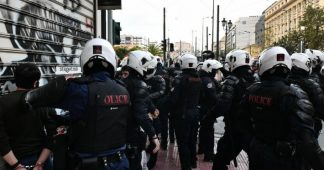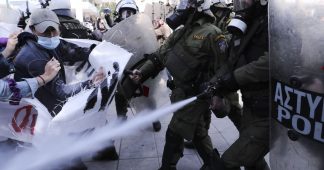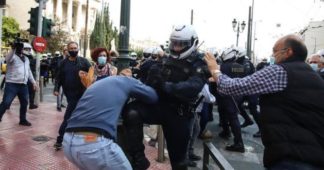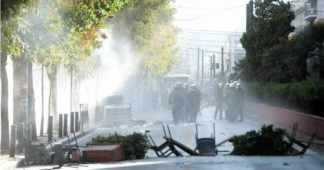Complaints of excessive violence, brutality and corruption by police are on the rise.
By Nektaria Stamouli
May 14, 2023
ATHENS — The biggest crime in Greece? The state of the police force.
That’s according to opposition politicians, who are putting security and law enforcement center-stage ahead of this month’s national election.
Syriza, the leftist main opposition party, accuses the conservative New Democracy, which is hoping for another term in office after the May 21 vote, of allowing the police to become run by organized crime gangs. The conservative government maintains a lead in the polls, although a second round will likely be needed and is penciled in for July 2.
“The Greek police are collaborating with the crime instead of fighting crime,” Syriza leader Alexis Tsipras said, adding that the “Greek mafia is in the police.”
For sure, Greek police have been in the headlines for all the wrong reasons of late, thanks to the alleged involvement of police officials in mafia gangs profiting from illegal brothels and casinos; the murder of a 16-year-old Roma boy during a police chase; an alleged rape in a central Athens police department; and complaints of police brutality.
The Greek police force has a long history of corruption and excessive use of force but since New Democracy was elected in 2019 — at least in part on a law-and-order platform — complaints have soared.
In recent protests following a deadly train crash, police were accused of using unjustified violence during peaceful rallies, with several videos exposing the brutality. In one case, police officers sped toward a group of peaceful protestors on motorcycles and threw firecrackers at their feet. Prosecutors have ordered an investigation after a police tow truck drove at high speed into dumpsters being wheeled into the middle of a street by protesters.
The chief of police, Konstantinos Skoumas, was replaced in March. In an open letter, Skoumas defended his record and blamed politicians for forcing him out, saying he wouldn’t be “anyone’s scapegoat,” and arguing that his actions “caused strong resentment in certain centers of power, which, as a result, led to the violent termination of my term of office.”
The opposition blames both the police and the interior ministry that oversees it. “Impunity, the cultivation of an omertà mentality, the lack of accountability, are unfortunately characteristic of the way the Greek police operates, with the tolerance, if not the complicity, of the ministry,” said Giorgos Kaminis of the socialist Pasok party.
Minister of Civil Protection Takis Theodorikakos hit back, calling Syriza’s accusations “slanderous” and “nationally damaging,” as they could potentially scare away tourists.
“Our daily concern in practice is the safety of citizens, which is why we put an end to the lawlessness and delinquency,” he said on a recent visit to a police station. “This is why in 2022 the Greek police arrested 7,000 illegal migrants in the Attica [region that includes Athens], and now we are placing 600 new special guards at the Attica police stations,” Theodorikakos said, adding that Greece is a safe country.
Government spokesman Akis Skertsos said on Monday that there has been a reduction in all medium and low crime rates during the government’s term. Comparing January to August of 2019 to the same period in 2022 there has been a 15 percent reduction in thefts and 35 percent reduction in robberies.
Complaints on the rise
In 2022, preliminary data from the Greek Ombudsman showed a 50 percent rise in citizens’ complaints against the police compared to 2019, the last pre-pandemic year, and a 14 percent rise in incidents of racially motivated police actions.
“The tone set by the political as well as the natural, operational leadership of the security forces undoubtedly plays a vital role” in these increases, Greek Ombudsman Andreas Pottakis told POLITICO. Pottakis said the government’s attitude toward the police was “overly supportive” and could “be misinterpreted” by officers, making them think they have “carte blanche” to do whatever they want.
One of the government’s first tasks after taking office four years ago was to revive a police motorcycle unit that had been disbanded under the previous Syriza government over human rights violations. Many of the 1,500 recruits were drafted from the ranks of military special forces, bypassing the police academy.
New Democracy’s efforts to establish the first university police force in Europe also failed. Α special unit with 1,000 officers was set up in September but still hasn’t set foot on campuses. The idea is so unpopular that on the rare occasions officers from the unit have ventured near universities, they have been accompanied by riot police. Some 600 officers meant for the uni police have already been transferred to other departments, the police confirmed.
Last month, an officer fired his gun into the air outside Athens University of Economics and Business in the center of the capital during clashes with hooded, masked youths.
Theodorikakos, the interior minister, said such incidents happened because, in the pre-election period, some people want to “blow up the political climate.” He added that some people “even want him dead,” a comment that was heavily criticized by the opposition.
“Let’s stop playing games at the expense of the seriousness of the issues, as [Prime Minister Kyriakos] Mitsotakis did with the university police,” said Pasok leader Nikos Androulakis. “He made a body which was paid for by the Greek taxpayers, did nothing of substance, and instead of apologizing he continues doing the same.”
Abuses of power
Police have also been accused of resorting to violence and intimidation to hamper journalists covering demonstrations and the refugee crisis on the country’s islands.
“We have cases of police officers arresting and even stripping lawyers and journalists off their clothes or humiliating them even though their professional identity is made known,” Pottakis, the ombudsman, said. “Young people are mainly targeted. The age element seems to act as an encouragement.”
Last December a 16-year-old Roma boy died after being shot in the head by police chasing him after he fled a petrol station allegedly without paying for €20 of fuel.
A 19-year-old girl reported she had been raped in a station by two policemen who filmed their actions in the main central police department last year. The officers involved said the sex was consensual. They have been suspended pending an investigation.
“We are heading from one fiasco to another,” said Syriza MP Christos Spirtzis. “Where are the internal investigations that have been conducted? There is no information, no one has been punished.”
Such investigations have, however, been launched. In January, Supreme Court prosecutor Isidoros Dogiakos and Interior Minister Theodorikakos ordered an investigation into the relationship between senior police officials and members of the mafia, after leaked conversations showed gang leaders negotiating with officers about continuing their activities undisturbed.
This was not the first report linking the police with organized crime.
Active and retired police officers stand accused, together with mafia members, of widespread corruption, with the criminal organization alleged to be running a protection racket involving 900 businesses — from clubs to brothels and casinos — with a turnover of at least €1 million per month.
Investigative website Reporters United revealed that one official implicated in the racket was promoted to director of the Attica Security Department, one of the most important positions in the fight against organized crime. Police later said they weren’t aware of the allegations against the officer.
“Citizens’ trust relationship with the police is broken when those who break their oath are not punished,” the ombudsman said.
We remind our readers that publication of articles on our site does not mean that we agree with what is written. Our policy is to publish anything which we consider of interest, so as to assist our readers in forming their opinions. Sometimes we even publish articles with which we totally disagree, since we believe it is important for our readers to be informed on as wide a spectrum of views as possible.











